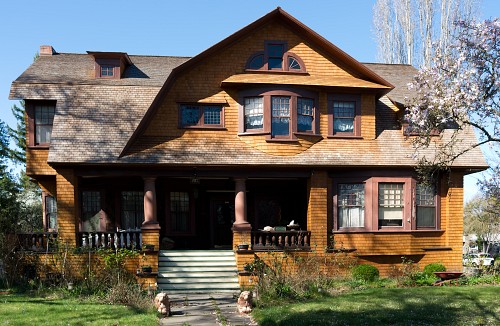Pros and Cons of Popular Roof Styles
 The roof is a major design element of your house. But let’s not forget its primary purpose: to protect you and your belongings from rain, wind, and weather in general. Whether you’re building a new home, buying a resale or contemplating a change in roofing type, it’s important to know how well various kinds of roofs perform -- and where they fall short. Here we examine popular roof styles in the USA, listing the pros and cons of each.
The roof is a major design element of your house. But let’s not forget its primary purpose: to protect you and your belongings from rain, wind, and weather in general. Whether you’re building a new home, buying a resale or contemplating a change in roofing type, it’s important to know how well various kinds of roofs perform -- and where they fall short. Here we examine popular roof styles in the USA, listing the pros and cons of each.
Gable Roof (Pitched Roof)
A pitched roof (AKA gable roof) is the most popular of all roof styles with American homeowners. Its simple inverted-V shape is relatively easy to install, although it does use more material than a flat roof in relation to the home’s square footage. The two pitched sides allow precipitation and melting snow to flow off easily. Obviously, though, any construction atop this roof will be difficult and an attic remodel will be limited due to the sloping eaves. (Check ceiling height code in your area – usually a certain percentage of remodeled space must be at least 7 feet.) Gable roofs are also vulnerable to being blown off in hurricane-prone regions.
Flat Roof
Installation or replacement of a flat roof is easy and inexpensive compared to other roof styles, because this basic style requires the least amount of labor and the smallest amount of roofing material to cover your house. Addition of skylights or solar panels is not a problem on the flat surface. It’s also convenient should you be considering an eventual attic remodel, green roof, or sun terrace – if there is easy access and the roofing is strong enough to support the extra weight. However, rainwater and snowmelt will puddle on a flat roof, though, due to lack of natural drainage, so it must be expertly waterproofed.
Hip Roof or Pyramid Roof
Somewhat more complex than a pitched roof, a hip roof comprises four sides, which meet at a central flat ridge and slope gently down toward the house. A pyramid roof is similarly constructed, except it is topped by a sharp peak. Both these roof styles are excellent at shedding moisture and even act to protect your siding and entranceways from rain, but their seams must be properly sealed and maintained to avoid roof leaks.
Dutch Hipped Roof
A Dutch hipped roof (yes, it did originate in Holland) could be described as the love child of a pitched roof and a hip roof. It consists of four large sloping sides under a mini two-sided gable roof, which is labeled a gablet. Besides its attractive appearance, it offers the advantage of keeping the rain out of the house without blocking sunshine. On the other hand, this is one of the more complicated roof styles to install, requiring more materials and a skilled roofing contractor who can carefully waterproof the join between the two parts.
Shed Roof
Originally used to cover farm sheds and lean-tos, the shed roof (also termed a skillion roof) has a single side, though unlike the flat roof, it is angled for better drainage. Shed roofs are now used as a dramatic architectural feature in some modern home designs. While they are great for solar panel and skylight installation, their odd angle will leave you with a constricted attic or oddly shaped rooms. A skillion roof will provide only limited protection from harsh weather and is best for mild climates.
Mansard Roof or Gambrel Roof
Four-sided, an elegant mansard roof has a gradual upper slope, leading to a steep lower slope which is equipped with dormer windows. While a gambrel roof -- otherwise known as a barn roof -- has only two sides, it resembles a mansard roof in terms of its double slope. Both offer the possibility of an extra floor of living space or storage. (Don’t let the name put you off with visions of lonely orphans or starving artists – this under-roof area is called a garret.) Their disadvantage is that they are complicated and costly roof styles to build and demand a great deal of maintenance.
Laura Firszt writes for networx.com.
Looking for a Pro? Call us (866) 441-6648

Average Costs
Related Experiences

Garage Roof Replacement Increases Curb Appeal Of A House For Sale

Roof Repair That Keeps The Snow Out Of Our Attic



